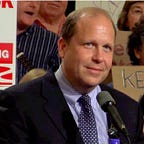I Support Full Legalization of Cannabis. Which is why Decriminalization is a Bad Idea.
I have been involved with Cannabis for a long time. 1975 marked my first exposure to what the hip kids call “Mary Jane” (that may not actually be true. I’m told I’m not the greatest authority on what the hip kids are doing) while I was a freshman at George School, working hard at being expelled (Mission Accomplished!)
When I was in the Pennsylvania Senate, I wrote and passed our state’s Medical Marijuana law, although my suggestion to call it “Medical Mary Jane” was rejected in a rare display of bi-partisan unanimity. My team and I also spent a year writing our state’s first fully formed Adult Use Cannabis bill, which numerous publications referred to as “the gold standard”. I have frequently written and spoken about why cannabis prohibition is an intrinsically evil and pernicious institution which must be ended as quickly as humanly possible. It is an irrational, racist, destroyer of lives. I want pot fully legal yesterday.
Despite my aggressive, bordering on obnoxious antipathy to laws banning cannabis, I am not a fan of decriminalization. Here’s why:
People often incorrectly use decriminalization interchangeably with legalization. Or, they will say that if we can’t pass legalization we should settle for decriminalization. Some say that decriminalization could be an appropriate first-step towards full legalization. While often well-intentioned, all of these ideas are terribly flawed.
First, legalization and decriminalization are very different public policies, an examination of the differences shows why decriminalization is unworkable. Legalization involves not only removing criminal penalties for the personal use and possession of cannabis, it also includes legalizing the growth, sale and production of cannabis, setting up a regulated market, creating an entity to police compliance and resolve disputes, enacting safety and labeling standards to allow purchasers to reliably know what they are consuming. It sets a framework of taxation so the community at large benefits. And it sets criteria for the issuance of licenses for vetted business men and women who then have a clear incentive to follow the rules.
Let’s contrast this with mere decriminalization. Yes, you as an individual can no longer be arrested for carrying or smoking a joint. However, nobody is allowed to sell that joint to you. There are no dispensaries playing Enya with helpful bud-tenders to recommend the “Rhubarb Haze” strain over “Jerry’s Wrinkled Tuchus” for bath time. On the contrary, you must still buy your supply from “Greenie” behind the bowling alley. There is no label telling you when it was tested for mold, or if it was tested for mold, or if it was rolled in a bucket of mold before you buy it.
You have no way of knowing if it’s 15% THC or 30% THC or 77% PCB. And since the only market is an entirely illegal market, if Greenie somehow rips you off or sells you a dangerous product, you can’t call the police or sue, and nobody will be pulling Greenie’s license. But it’s not just consumers who will suffer. I’m told that Greenie is not a stickler for paying taxes. Although, since a product that is illegal to sell has no set tax rate, Greenie’s honesty isn’t really an issue. There is no state revenue for roads or schools or tax cuts or whatever purpose the voters in your area see fit.
To me, the worst part of a decriminalization-only bill is it’s failure to establish a legitimate market. The result is that the proceeds of the black market will continue to largely support criminal enterprises for whom selling weed is not their only crime. Every dime (or most dimes anyway) that does not go into the pocket of a licensed, vetted entrepreneur, ultimately goes into the pocket of a violent drug cartel. I don’t think I’d be that comfortable consuming if I knew that a portion of what I paid for my product is going to help El Chapo behead a few more dudes who infringed on his turf.
By the way, in the event that El Chapo escapes from prison again, I was just kidding about the whole beheading thing. El Chapo is a great guy!
Decriminalization results in fewer people being dumped into the criminal justice system for smoking a plant that is orders of magnitude more benign than alcohol. But by perpetuating the worst parts of prohibition, it legitimizes the irrational stigmas that have led to so many unjust cannabis laws.
Assuming I’ve demonstrated that legalization is a far superior policy to decriminalization, one question remains: Isn’t it a good first step towards legalization? The short answer is no. Actually, the long answer is also no.
As a lifelong student of politics and a member of a full-time legislature for 18 years, I’ve learned that on most issues, there is almost always only one bite at the apple. These bills are tough, complex, politically fraught and difficult to get moving. If we can finally convince a state legislature or Congress to consider a major cannabis bill, we aren’t going to get them to consider another major cannabis bill for years, probably many years. If a legislature passes a decriminalization bill, it will consider cannabis “dealt with” and move on to other things. There will be no full legalization bill following quickly on the heels of decriminalization.
The time is right to go for the gold (no pun intended, or even present really). Public opinion, and the momentum of history are all calling on us to finally end prohibition once and for all by fully legalizing cannabis. Pale, unambitious, unworkable and ultimately pernicious policies are not what the times call for. Let’s put our energy into doing what’s right. ALL of what’s right.
